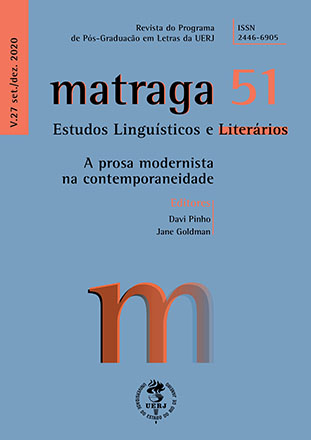Outlines of the modernist prose in The Waves
DOI:
https://doi.org/10.12957/matraga.2020.49229Keywords:
Modernist Prose, Virginia Woolf, The Waves.Abstract
This article aims to investigate how the form of Virginia Woolf’s novel The Waves (1931) presents itself as the expression of her political and feminist modernist prose. The voices of the six different main characters unfold throughout time, from childhood to old age, and they are interspersed with interludes that present the course of a day, parallel instances that intertwine in the complementarity of human being and nature. The immense importance the author always placed on the form of her texts is not under question, especially as she explored it to the point of blurring the boundaries of both literary and non-literary genres. Based on several of her essays and excerpts from her diaries, besides taking into consideration the contribution of seminal texts within Woolf scholarship, this article proposes that a significant form can be envisioned as a collage of colors, lights and shadows that enclose the multiplicity of oneness of which this mosaic consists.Downloads
Downloads
Published
How to Cite
Issue
Section
License
Authorization
Matraga – Scientific Journal of the Post-graduate Program in Arts and Humanities of UERJ is authorized to publish the article submitted here, if it is accepted for online publication. It is attested that the contribution is original, that it is not being submitted to another publisher for publication, and that this statement is the expression of truth.
The works published in Matraga's virtual space – Scientific Journal of the Post-graduate Program in Arts and Humanities of UERJ will be automatically transferred, and your copyright is reserved to Matraga. Its reproduction, in whole or in part, is conditional on the citation of the authors and the data of the publication.

Matraga uses license Creative Commons - Attribution-Non-Commercial 4.0 International.





